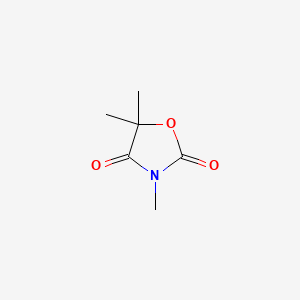



1. Tridione
2. Trimetin
3. Troxidone
1. 127-48-0
2. Tridione
3. Troxidone
4. Trimetadione
5. Trimethadion
6. Absentol
7. Epidione
8. Trimetin
9. Minoaleviatin
10. Convenixa
11. Convexina
12. Petidion
13. Petimalin
14. Tioxanona
15. Tridilona
16. Trimedal
17. Trimethin
18. Trioxanona
19. Absetil
20. Epixal
21. Petidon
22. Petilep
23. Ptimal
24. Tridion
25. Edion
26. Tridone
27. Trimethdione
28. 3,5,5-trimethyl-1,3-oxazolidine-2,4-dione
29. 3,5,5-trimethyloxazolidine-2,4-dione
30. Minoaleuiatin
31. Trimethadionum
32. Tredione
33. Tricione
34. Trilidona
35. Trimedone
36. Triozanona
37. Tromedone
38. Epidone
39. Etydion
40. Pitmal
41. 2,4-oxazolidinedione, 3,5,5-trimethyl-
42. 3,5,5-trimethyl-2,4-oxazolidinedione
43. Mino-aleviatin
44. 3,5,5,-trimethyloxazolidine-2,4-dione
45. A 2297
46. 3,3,5-trimethyl-2,4-diketooxazolidine
47. Nsc 15799
48. 3,5,5-trojmetylooksazolidyno-2,4-dion
49. Nsc-15799
50. Nsc-169503
51. R7gv3h6fq4
52. Trimethinum
53. Trioksal
54. 3,5,5-trimethyl-oxazolidine-2,4-dione
55. Trimethyl-1,3-oxazolidine-2,4-dione
56. J2.519d
57. Ncgc00016383-01
58. Trimetadiona
59. Cas-127-48-0
60. Trimetadione [dcit]
61. Dsstox_cid_1396
62. 2, 3,5,5-trimethyl-
63. Dsstox_rid_76137
64. Dsstox_gsid_21396
65. Trimetadiona [inn-spanish]
66. Trimethadionum [inn-latin]
67. 3,5-trimethyl-2,4-oxazolidinedione
68. 3,5-trimethyl-2,4-diketooxazolidine
69. Wln: T5ovnv Ehj C1 E1 E1
70. Tridione (tn)
71. Einecs 204-845-8
72. 3,5,5-trojmetylooksazolidyno-2,4-dion [polish]
73. Unii-r7gv3h6fq4
74. Brn 0121627
75. Mino Aleviatin
76. Tridione Dulcet
77. Trimethadione [usp:inn:ban:jan]
78. Prestwick_815
79. Mfcd00047084
80. Prestwick0_000515
81. Prestwick1_000515
82. Prestwick2_000515
83. Prestwick3_000515
84. Trimethadione [mi]
85. Chembl695
86. Trimethadione [inn]
87. Trimethadione [jan]
88. Trimethadione (jp17/inn)
89. Schembl28882
90. Bspbio_000469
91. Trimethadione [vandf]
92. Mls001076685
93. Trimethadione [mart.]
94. Spbio_002390
95. Trimethadione [usp-rs]
96. Trimethadione [who-dd]
97. Trimethadione [who-ip]
98. Bpbio1_000517
99. Chebi:9727
100. Gtpl7316
101. Dtxsid9021396
102. Iryjrgciqbghiv-uhfffaoysa-
103. Hms1569h11
104. Hms2093d10
105. Hms2096h11
106. Hms2235e12
107. Hms3713h11
108. Hms3886i12
109. Pharmakon1600-01505466
110. Trimethadione [orange Book]
111. Hy-a0092
112. Nsc15799
113. Zinc1530710
114. Tox21_110408
115. Tox21_200231
116. Trimethadione [ep Monograph]
117. Bdbm50227239
118. Nsc169503
119. Nsc759152
120. S5567
121. Trimethadione 1.0 Mg/ml In Methanol
122. Trimethadionum [who-ip Latin]
123. Akos006229172
124. Ccg-213460
125. Db00347
126. Nsc-759152
127. 3,5,5-trimethyl Oxazolidine-2,4-dione
128. Ncgc00016383-02
129. Ncgc00016383-03
130. Ncgc00016383-05
131. Ncgc00257785-01
132. Bs-15128
133. Smr000499583
134. Sbi-0206923.p001
135. Ft-0694585
136. D00392
137. D84162
138. 3,5,5-trimethyl-1,3-oxazolidine-2,4-dione #
139. Q827916
140. Sr-01000763540
141. J-005496
142. Sr-01000763540-2
143. Brd-k16606819-001-07-7
144. 3,5,5,-trimethyloxazolidine-2,4-dione, Analytical Standard
145. Trimethadione, European Pharmacopoeia (ep) Reference Standard
146. Trimethadione, United States Pharmacopeia (usp) Reference Standard
| Molecular Weight | 143.14 g/mol |
|---|---|
| Molecular Formula | C6H9NO3 |
| XLogP3 | 0.3 |
| Hydrogen Bond Donor Count | 0 |
| Hydrogen Bond Acceptor Count | 3 |
| Rotatable Bond Count | 0 |
| Exact Mass | 143.058243149 g/mol |
| Monoisotopic Mass | 143.058243149 g/mol |
| Topological Polar Surface Area | 46.6 Ų |
| Heavy Atom Count | 10 |
| Formal Charge | 0 |
| Complexity | 197 |
| Isotope Atom Count | 0 |
| Defined Atom Stereocenter Count | 0 |
| Undefined Atom Stereocenter Count | 0 |
| Defined Bond Stereocenter Count | 0 |
| Undefined Bond Stereocenter Count | 0 |
| Covalently Bonded Unit Count | 1 |
| 1 of 2 | |
|---|---|
| Drug Name | Tridione |
| Drug Label | TRIDIONE (trimethadione) is an antiepileptic agent. An oxazolidinedione compound, it is chemically identified as 3,5,5-trimethyloxozolidine-2,4-dione, and has the following structural formula:TRIDIONE is a synthetic, water-soluble, white, crystalline... |
| Active Ingredient | Trimethadione |
| Dosage Form | Tablet |
| Route | Oral |
| Strength | 150mg |
| Market Status | Prescription |
| Company | Abbvie |
| 2 of 2 | |
|---|---|
| Drug Name | Tridione |
| Drug Label | TRIDIONE (trimethadione) is an antiepileptic agent. An oxazolidinedione compound, it is chemically identified as 3,5,5-trimethyloxozolidine-2,4-dione, and has the following structural formula:TRIDIONE is a synthetic, water-soluble, white, crystalline... |
| Active Ingredient | Trimethadione |
| Dosage Form | Tablet |
| Route | Oral |
| Strength | 150mg |
| Market Status | Prescription |
| Company | Abbvie |
Used in the control of absence (petit mal) seizures that are refractory to treatment with other medications.
Paramethadione and trimethadione are anticonvulsants indicated in the control of absence (petit mal) seizures that are refractory to treatment with other medications. Dione anticonvulsants are used in the treatment of epilepsy. They act on the central nervous system (CNS) to reduce the number of seizures.
Anticonvulsants
Drugs used to prevent SEIZURES or reduce their severity. (See all compounds classified as Anticonvulsants.)
N - Nervous system
N03 - Antiepileptics
N03A - Antiepileptics
N03AC - Oxazolidine derivatives
N03AC02 - Trimethadione
Trimethadione has known human metabolites that include Dimethadione.
S73 | METXBIODB | Metabolite Reaction Database from BioTransformer | DOI:10.5281/zenodo.4056560
Dione anticonvulsants reduce T-type calcium currents in thalamic neurons, including thalamic relay neurons. It does so via the inhibition of voltage dependent T-type calcium channels. This raises the threshold for repetitive activity in the thalamus, and inhibits corticothalamic transmission. Thus, the abnormal thalamocortical rhythmicity, which is thought to underlie the 3-Hz spike-and-wave discharge seen on electroencephalogram(EEG) with absence seizures, is dampened.